Product Overview
Taurine is a conditionally essential amino acid naturally produced in the human body and concentrated in tissues like the heart, brain, and retina. Unlike most amino acids, taurine is not incorporated into proteins but instead serves diverse roles in cellular function.[1]
As a compounded prescription medication, Taurine Injection 50 mg/mL (30 mL vial) is used to augment taurine levels in certain medical conditions where supplementation may be beneficial. For example, taurine therapy has been explored as an adjunct in cardiovascular diseases (such as congestive heart failure and hypertension) and metabolic or liver disorders (including high cholesterol and chronic hepatitis), and even in supportive treatment of cystic fibrosis.[2][4]
Taurine’s antioxidant and membrane-stabilizing properties have also prompted its use to help protect cells from chemotherapy-induced damage in cancer patients.[5] This injectable formulation is prepared by a 503A compounding pharmacy or 503B outsourcing facility and is tailored to patient needs under the guidance of a healthcare provider (prescription required).
It is not an FDA-approved commercial drug; rather, it is a customized therapy intended to address specific taurine deficiencies or therapeutic goals in patients.
Administration: Taurine Injection can be given intramuscularly or intravenously (slow push or infusion), as directed by a physician.
Dosage: There is no one-size-fits-all dose; the amount and frequency are determined by the healthcare provider based on the patient’s indication and response. In clinical studies, oral taurine supplementation has ranged from about 1 to 6 grams per day in adults.[18][19] For example, trials in heart failure have used roughly 3-6 g per day in divided doses, while some liver disease studies employed around 6 g per day for a limited duration.[18] Pediatric dosing (for instance, in cystic fibrosis) has been about 30 mg per kg body weight per day in research settings.[4]
When using the 50 mg/mL injection, the physician will calculate the appropriate volume (in milliliters) to reach the target dose. Taurine injections might be given a few times per week or as a periodic infusion, depending on the clinical goals. It is important to follow the dosing schedule provided by the healthcare professional and not to exceed the prescribed amount. If a dose is missed, consult the provider for guidance rather than doubling up doses.
Taurine exerts its effects through multiple mechanisms of action. It functions as an osmolyte that helps regulate intracellular water content and electrolyte balance, thereby maintaining proper cell hydration and volume.[6][7]
Taurine also modulates calcium signaling in cells and interacts with neurotransmitter receptors, contributing to neuroprotective and stabilizing effects in the central nervous system.[7] In the heart and muscle tissues, taurine’s influence on calcium flux and membrane stability can support normal contractility and protect against calcium overload or arrhythmias.[6]
Additionally, taurine conjugates with bile acids in the liver to form bile salts, aiding in digestion and cholesterol excretion. It possesses significant antioxidant and anti-inflammatory activity, scavenging reactive oxygen species and inhibiting pro-inflammatory pathways (such as NF-κB) to protect tissues from oxidative stress damage.[6]
These combined actions underlie taurine’s broad potential benefits, helping to stabilize cells, improve metabolic parameters, and protect vital organs; which may translate into improved cardiovascular, liver, and nervous system function in various clinical contexts.[8]
Because taurine is a naturally occurring amino acid, there are no well-defined contraindications for its use apart from hypersensitivity to taurine or any component of the injection formulation. Patients with a known allergy to taurine or the diluents (e.g. the preservative in the vial) should not receive taurine injections.[9][10] Note: Standard multi-dose taurine vials contain benzyl alcohol as a preservative, and benzyl alcohol is contraindicated in neonates due to the risk of a potentially fatal “gasping syndrome”.[11] Therefore, Taurine Injection should not be used in newborn infants.
Caution is also advised in individuals with certain inborn errors of amino acid metabolism or those on extremely high-protein diets, although no specific taurine-related contraindications have been documented to date.[9] As always, a healthcare professional will screen for any individual risk factors or allergies before recommending taurine therapy.
Taurine has mild interactions with a number of medications, though serious drug interactions are not commonly reported.[12][13] Notably, taurine can inhibit the liver enzyme CYP2E1, which is involved in the metabolism of many substances (including certain anesthetics, acetaminophen, and alcohol). This means co-administration of taurine with drugs that rely on the CYP2E1 pathway could alter their clearance or effects.[12]
There are also theoretical interactions where taurine may potentiate the effects of other medications: for instance, some sources suggest caution when taurine is combined with anticoagulant or antiplatelet drugs due to a potential increase in bleeding risk.[13] Similarly, taurine might add to the blood-sugar-lowering effect of insulin or anti-diabetic drugs, or enhance the sedative effect of CNS depressants, although clear clinical evidence of harm is lacking.
Overall, taurine is considered to have a low interaction profile. It is still important to inform your healthcare provider about all medications and supplements you are taking, so that any potential interaction can be monitored and managed appropriately.[13]
Taurine injection is generally well tolerated, with minimal adverse effects observed in human studies.[14][15] No significant side effects have been noted at moderate dosages; even doses of several grams per day produce no serious reactions.[14] In fact, taurine has been administered in research trials at up to 10 grams per day for several months without toxicity.[15]
Only minor, transient symptoms have been reported infrequently, such as mild nausea or headache in a small subset of individuals.[14] There is also no evidence that taurine causes stimulant-like effects (unlike caffeine) or any dependence/withdrawal issues. Overall, side effects are rare, and taurine therapy is considered very safe within recommended dosing ranges.[15]
Due to insufficient data on safety, taurine supplementation is not recommended during pregnancy or breastfeeding. Trace amounts of taurine do reach the developing fetus (taurine naturally crosses the placenta and is present in breast milk), but using taurine above normal dietary levels in pregnant individuals has not been studied and is generally discouraged.[16][17]
There is no established pregnancy category for taurine; however, experts advise that it should be used in pregnancy only if the potential benefit clearly outweighs any potential risk. Nursing mothers are likewise advised to avoid taurine injections or high-dose supplements, since it is unknown how excess taurine might affect a breastfed infant.[16]
If a patient is or becomes pregnant while on taurine therapy, the provider will typically discontinue the injection or switch to alternative treatments with better-established safety profiles.
Taurine Injection should be stored at controlled room temperature, generally defined as 20-25 °C (68-77 °F).[19][20] Keep the vial in its original packaging until use, and protect it from light exposure to prevent degradation.[19] Do not freeze the medication.
If the injection is supplied in a multi-dose vial, discard any unused solution after the beyond-use date provided by the pharmacy. Always keep this and other medications out of reach of children. Proper storage ensures the product remains stable and effective until its expiration or beyond-use date.
For disposal of any unused taurine solution or expired vials, follow pharmacy or local guidelines (do not flush or pour into drains).
- Schaffer, S., & Kim, H. W. (2018). Effects and mechanisms of taurine as a therapeutic agent. Biomolecular Therapy, 26(3), 225-241. https://doi.org/10.4062/biomolther.2017.251
- Wójcik, O. P., Koenig, K. L., Zeleniuch-Jacquotte, A., Costa, M., & Chen, Y. (2010). The potential protective effects of taurine on coronary heart disease. Atherosclerosis, 208(1), 19-25. https://doi.org/10.1016/j.atherosclerosis.2009.06.002
- .Hu, Y. H., Lin, C. L., Huang, Y. W., Liu, P. E., & Hwang, D. F. (2008). Dietary amino acid taurine ameliorates liver injury in chronic hepatitis patients. Amino Acids, 35(2), 469-473. https://doi.org/10.1007/s00726-007-0565-5
- Belli, D. C., Levy, E., Darling, P., Leroy, C., Lepage, G., Giguère, R., & Roy, C. C. (1987). Taurine improves the absorption of a fat meal in patients with cystic fibrosis. Pediatrics, 80(4), 517-523.
- Chowdhury, S., Sinha, K., Banerjee, S., & Sil, P. C. (2016). Taurine protects against cisplatin-induced cardiotoxicity by modulating oxidative stress and endoplasmic reticulum stress responses. BioFactors, 42(6), 647-664. https://doi.org/10.1002/biof.1305
- Baliou, S., Kyriakopoulos, A. M., Spandidos, D. A., & Zoumpourlis, V. (2021). Protective role of taurine against oxidative stress (Review). Molecular Medicine Reports, 24(2), 605. https://doi.org/10.3892/mmr.2021.12242
- Ripps, H., & Shen, W. (2012). Taurine: A “very essential” amino acid. Molecular Vision, 18, 2673-2686. (PMCID: PMC3501277)
- Xu, Y. J., Arneja, A. S., Tappia, P. S., & Dhalla, N. S. (2008). The potential health benefits of taurine in cardiovascular disease. Experimental & Clinical Cardiology, 13(2), 57-65. (PMCID: PMC2586397)
- Drugs..com. (2025). Taurine: Uses, Benefits & Dosage (Natural Medicines Comprehensive Database). Retrieved May 27, 2025, from https://www.drugs.com/npp/taurine.html
- RxList. (2023). Taurine - Side Effects, Uses, Dosage, Interactions, Warnings. Retrieved May 27, 2025, from https://www.rxlist.com/taurine/generic-drug.htm
- Centers for Disease Control and Prevention. (1982). Neonatal deaths associated with use of benzyl alcohol - United States. Morbidity and Mortality Weekly Report, 31(22), 290-291. Retrieved from https://www.cdc.gov/mmwr/preview/mmwrhtml/00001109.htm
- Van De Walle, G., & Mawer, R. (2023). What is taurine? Benefits, side effects, and more. Healthline. Retrieved May 27, 2025, from https://www.healthline.com/nutrition/what-is-taurine
- WebMD. (n.d.). Taurine - Uses, Side Effects, and More. Retrieved May 27, 2025, from https://www.webmd.com/vitamins/ai/ingredientmono-1024/taurine
- Brooks, M. (2019, July 19). A quick tour of taurine. Medical News Today. Retrieved May 27, 2025, from https://www.medicalnewstoday.com/articles/326476
- Medical Dialogues. (n.d.). Taurine: Indications, Uses, Dosage, Drug Interactions, Side Effects. Retrieved May 27, 2025, from https://medicaldialogues.in/generics/taurine-2725822
- Harris Health System. (2023). Taurine. Retrieved May 27, 2025, from https://healthlibrary.harrishealth.org/search/19,Taurine
- UMass Memorial Health. (2023). Taurine. Retrieved May 27, 2025, from https://myhealth.umassmemorial.org/search/19,Taurine
- .Examine.com. (2023). Taurine - Supplement Summary. Retrieved May 27, 2025, from https://examine.com/supplements/taurine/
- Caine, J. J., & Geracioti, T. D. (2016). Taurine, energy drinks, and neuroendocrine effects. Cleveland Clinic Journal of Medicine, 83(12), 895-904. https://doi.org/10.3949/ccjm.83a.15050
- DailyMed. (2023). Naproxen Sodium capsule, 220 mg - Label Information. Retrieved May 27, 2025, from https://dailymed.nlm.nih.gov/dailymed/drugInfo.cfm?setid=5d8c4c8c-76a9-4c6e-a4f2-2971451c2e55
- Newton, L. A., & Goebel, L. J. (2016). Drug storage and stability. In J. M. Galli & A. Gupta (Eds.), Pharmacology for Prehospital Emergency Care (2nd ed.). (Retrieved from EM-Consulte database)
Do I need a prescription for taurine injection?
Yes. Taurine Injection is a compounded prescription medication, which means it is made by a pharmacy or outsourcing facility on a prescription basis.
You cannot obtain it over-the-counter; it must be prescribed by a licensed healthcare provider who has determined that taurine therapy is appropriate for your condition.
How is taurine injection different from taurine in energy drinks or pills?
Taurine in energy drinks or oral supplements is typically taken by mouth and absorbed through the digestive system. In contrast, taurine injection delivers the amino acid directly into the bloodstream (via intramuscular or intravenous administration), which can achieve higher bioavailability and more immediate effect.
The injectable form is used under medical supervision for specific therapeutic purposes, whereas the taurine in beverages or pills is usually for general dietary supplementation. Additionally, energy drinks contain relatively small taurine amounts and often include stimulants like caffeine; taurine injections contain no caffeine and are used purely for their potential medical benefits, not for an acute stimulant effect.
What improvements might I notice with taurine injection?
The effects can vary depending on why it’s prescribed. Some patients with heart failure or hypertension may experience improved exercise tolerance or better blood pressure control (as taurine has been associated with supporting cardiac function and vasodilation). Those receiving taurine for metabolic or liver conditions might see improvements in lab values such as cholesterol levels or liver enzymes over time.[2][4]
It’s important to have realistic expectations: taurine is often used as a supportive therapy, so changes might be subtle or gradual. Your doctor will monitor appropriate clinical markers (heart function, blood tests, etc.) to gauge effectiveness.
Patients generally do not “feel” immediate effects in a dramatic way (it’s not a stimulant), but over weeks to months taurine may contribute to better organ function and overall wellness as part of a broader treatment plan.
Is taurine injection safe for long-term use?
Taurine has an excellent safety profile. Clinical studies have used taurine supplementation for many months without observing significant adverse effects.[14] Unlike some medications, taurine does not build up to cause toxicity at typical doses, and it isn’t habit-forming.
If your provider recommends long-term use, they will periodically evaluate your response, but no specific organ damage or serious risk has been linked to chronic taurine administration. It is always important to stick to the prescribed dose and schedule.
As a precaution, your healthcare team will monitor your progress, but current evidence suggests that taurine is very safe even with extended use.[15]
Why isn’t taurine injection FDA-approved?
Taurine Injection falls under the category of a compounded medication. This means it is made by a compounding pharmacy or outsourcing facility, using the pure taurine ingredient combined into a sterile solution. Compounded drugs are not FDA-approved because they are not mass-produced or marketed by pharmaceutical companies; instead, they are prepared pursuant to a prescription for a unique patient.
The FDA does allow 503A and 503B compounding of medications like taurine for specialized needs, but the safety and efficacy of this particular formulation have not been evaluated by the FDA in formal trials. Essentially, the lack of FDA approval is not because taurine is known to be unsafe; it’s because taurine injection is a customized treatment that hasn’t gone through the extensive (and expensive) FDA drug approval process.
Patients should use it under medical supervision, and both patients and providers should report any adverse effects just as they would with commercially approved drugs.
Disclaimer: This compounded medication is prepared under section 503A and 503B of the U.S. Federal Food, Drug, and Cosmetic Act. Safety and efficacy for this formulation have not been evaluated by the FDA. Therapy should be initiated and monitored only by qualified healthcare professionals.
Administration Instructions
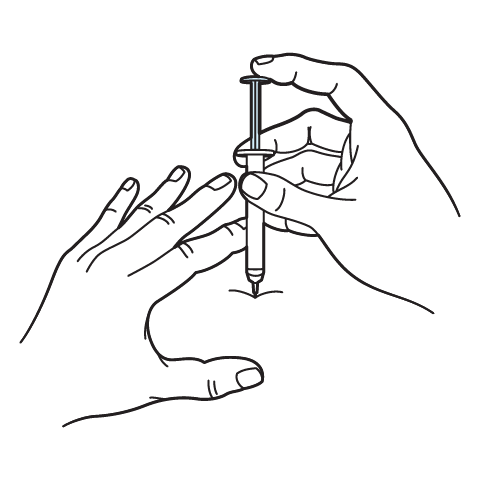
Intramuscular Injection Instructions
503A vs 503B
- 503A pharmacies compound products for specific patients whose prescriptions are sent by their healthcare provider.
- 503B outsourcing facilities compound products on a larger scale (bulk amounts) for healthcare providers to have on hand and administer to patients in their offices.
Frequently asked questions
Our team of experts has the answers you're looking for.
A clinical pharmacist cannot recommend a specific doctor. Because we are licensed in all 50 states*, we can accept prescriptions from many licensed prescribers if the prescription is written within their scope of practice and with a valid patient-practitioner relationship.
*Licensing is subject to change.
Each injectable IV product will have the osmolarity listed on the label located on the vial.
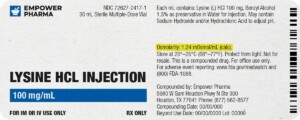
Given the vastness and uniqueness of individualized compounded formulations, it is impossible to list every potential compound we offer. To inquire if we currently carry or can compound your prescription, please fill out the form located on our Contact page or call us at (877) 562-8577.
We source all our medications and active pharmaceutical ingredients from FDA-registered suppliers and manufacturers.


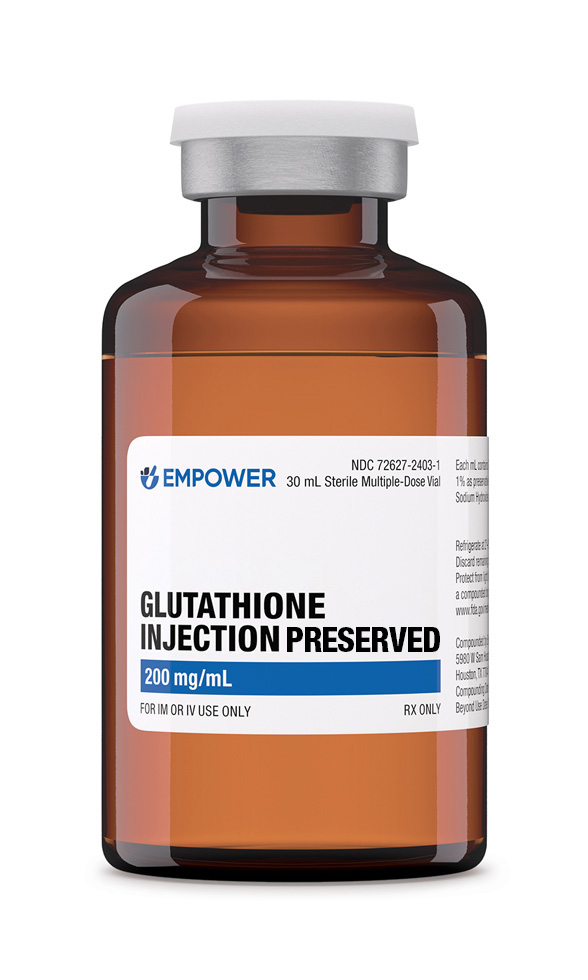 Glutathione Injection
Glutathione Injection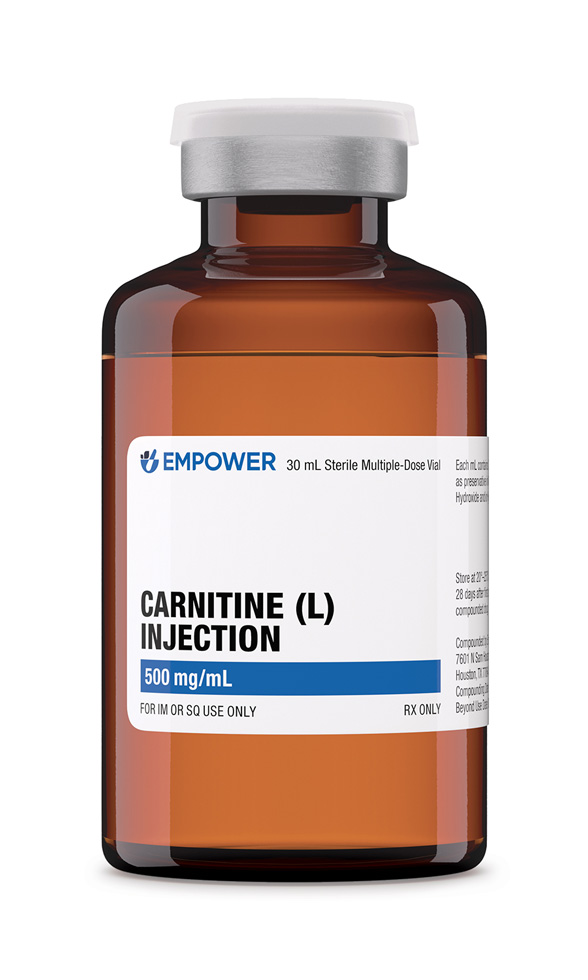 Carnitine (L) Injection
Carnitine (L) Injection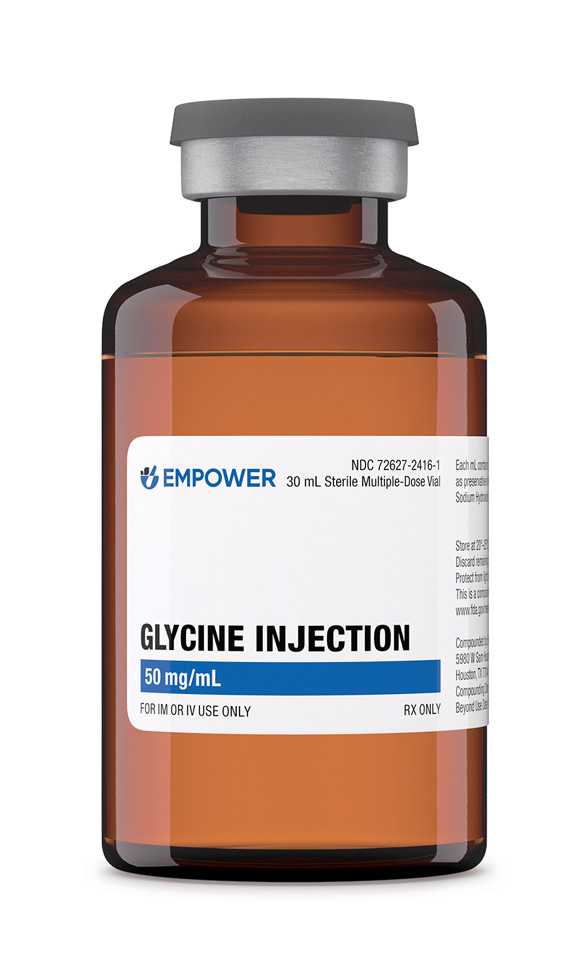 Glycine Injection
Glycine Injection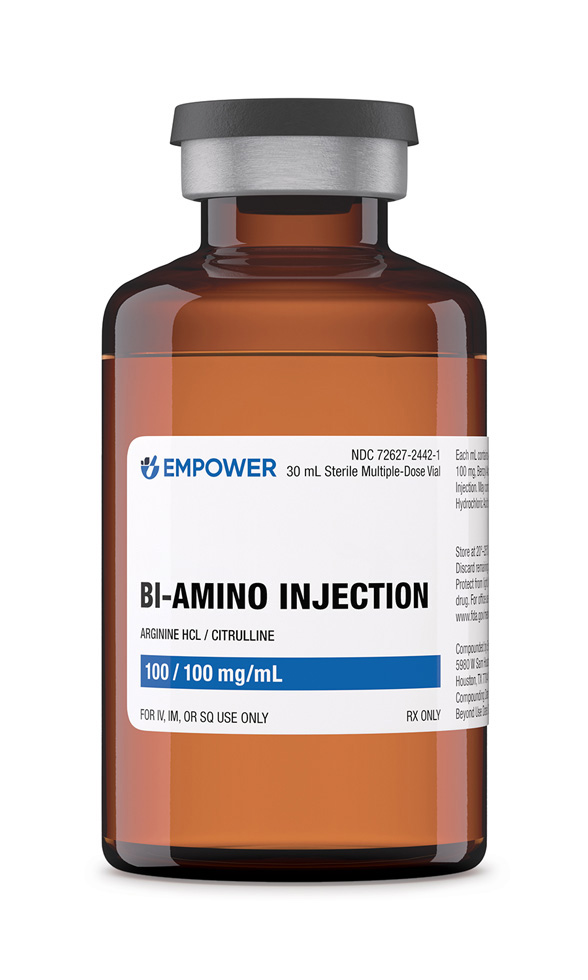 Bi-Amino Injection
Bi-Amino Injection Lysine HCL Injection
Lysine HCL Injection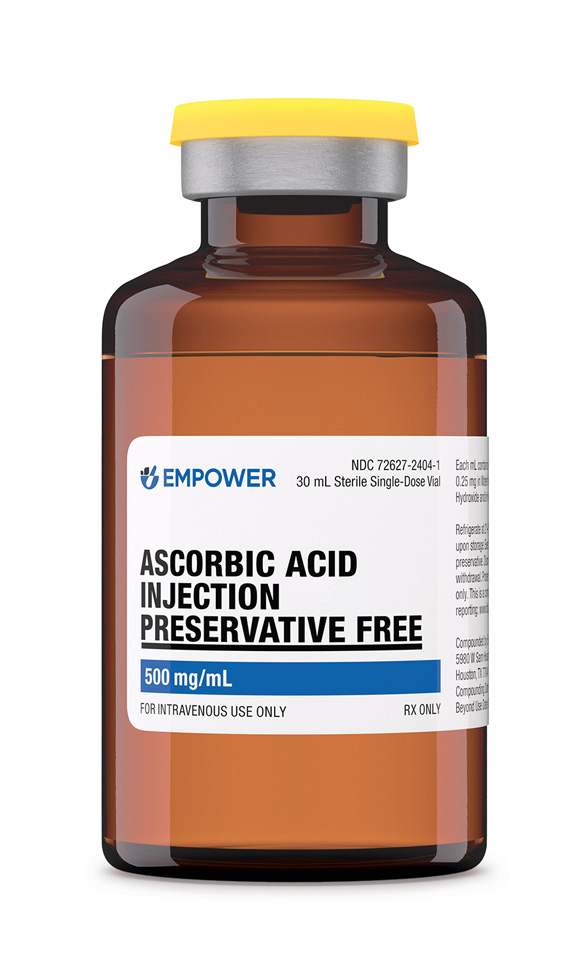 Ascorbic Acid (Vitamin C) Injection
Ascorbic Acid (Vitamin C) Injection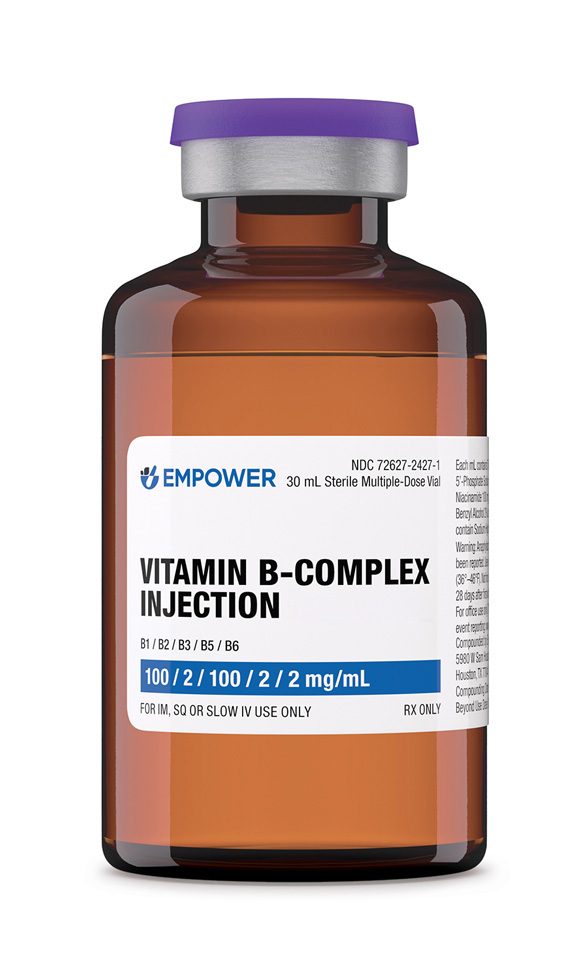 Vitamin B-Complex Injection
Vitamin B-Complex Injection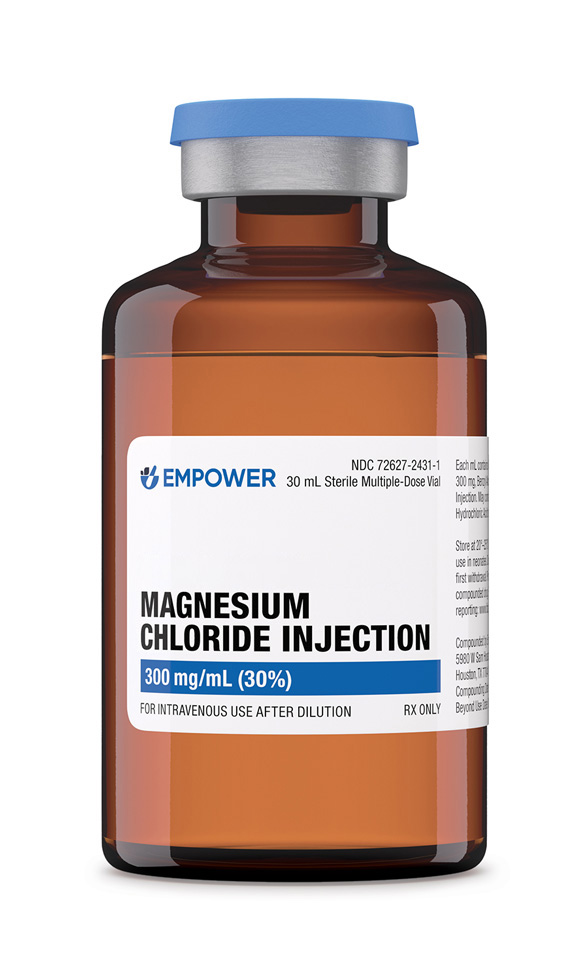 Magnesium Chloride Injection
Magnesium Chloride Injection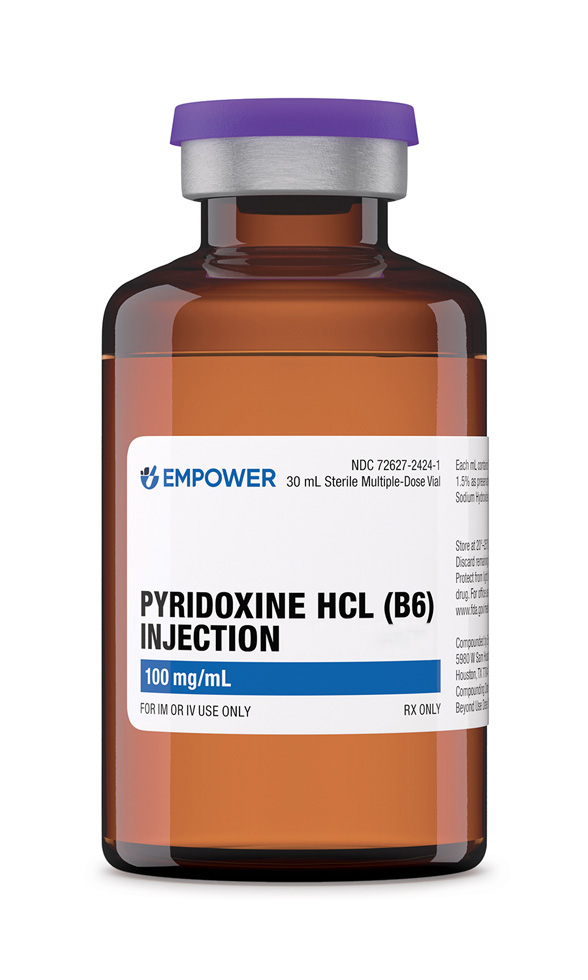 Pyridoxine HCl Injection
Pyridoxine HCl Injection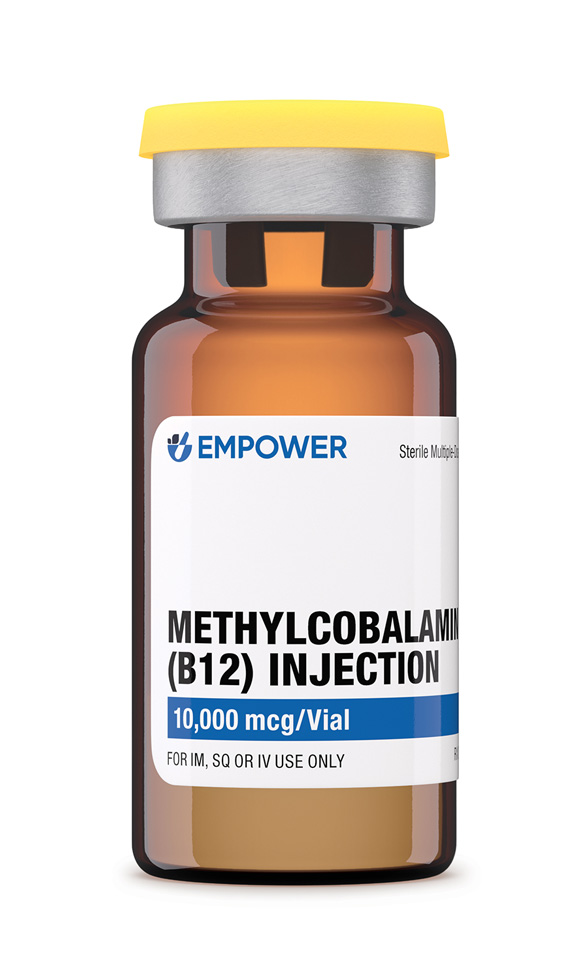 Methylcobalamin Injection (Vitamin B12)
Methylcobalamin Injection (Vitamin B12)